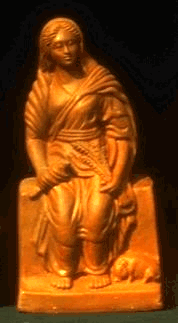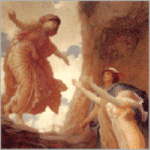|
Demeter & Persephone
A Myth for Mother's Day
... and all-seeing Zeus sent a messenger to dark-cloaked Demeter, rich-haired Rhea, to bring her to join the families of the gods. Swiftly she rushed down from the peaks of Olympus and came to the plain of Rharus, rich, fertile corn-land once, but then in no way fruitful, for it lay idle and utterly leafless.
Then bright-coiffed Rhea said to Demeter, "Come, my daughter; for far-seeing Zeus calls you to join the families of the gods, and has agreed that for a third part of the circling year your daughter shall go down to darkness and gloom, but for the two parts shall be with you and the other deathless gods. But come, my child, obey, and be not too angry with dark-clouded Zeus; but rather increase forthwith the fruit that gives men life."
Demeter did not refuse but straightaway made fruit to spring up from the rich lands, so that the whole wide earth was laden with leaves and flowers. Happy is he among men upon earth who has seen these mysteries.
And now, queen of the land of sweet Eleusis and sea-girt Paros and rocky Antron, lady, giver of gifts, bringer of seasons, Queen Demeter, be gracious, you and your daughter the beautiful Persephone, and for my song grant me heart-cheering food and drink. For now we will always remember you.
|
 |
Today is Mother's Day, a day we have been celebrating for at least as long as recorded history, and perhaps for as long as human beings have made myths and held celebrations. From our present vantage point we can reliably reach back only as far as the ancient myths of Greece, to the story of Demeter and her daughter Persephone, as told by Homer some 27 centuries ago.
This is the story of how the abduction of Persephone by Hades caused a world-wide famine, which ultimately led Zeus to ask Demeter to become Mother Earth, the Goddess of the Harvest. The story is more than just an allegory of how the barren lands of winter can bring forth the bountiful crops of a summer's growing season, it is also a dramatic tale of a mother's great loss, transformed through bitter pain into the eternal rhythm of life itself. It is a story of recovery from grief, and the renewal of life.
The reading today was taken from the end of the Hymn to Demeter, a poem often attributed to Homer. In the end the fertility of the world was restored, and a cycle of seasons established. But to get to this end, Demeter first had to lose her daughter, Persephone. Here is a short portion from the beginning of the hymn:
Far from Demeter she was playing with the deep-bosomed daughters of Oceanus and gathering flowers over a soft meadow, roses and crocuses and beautiful violets, irises also and hyacinths and the narcissus which Earth made to grow at the will of Zeus, to be a trap for the bloom-like girl—a marvelous, radiant flower. The meadow was a thing of awe to see: from its root grew a hundred blooms and it smelled most sweetly, so that all wide heaven above and the whole earth and the sea's salt swell laughed for joy. And the girl was amazed and reached out with both hands; but the wide-pathed earth yawned, and Hades sprang out upon her. He caught her up reluctant on his golden chariot and bore her away lamenting.
And so long as Persephone yet beheld earth and starry heaven and the strong-flowing sea where fishes shoal, and the rays of the sun, and still hoped to see her dear mother and the tribes of the eternal gods, so long hope calmed her great heart for all her trouble. . . . and the heights of the mountains and the depths of the sea rang with her immortal voice: and her queenly mother heard her.
Bitter pain seized Demeter's heart, and she rent the covering upon her divine hair with her dear hands: her dark cloak she cast down from both her shoulders and sped, like a wild-bird, over the firm land and yielding sea, seeking her child. But no one would tell her the truth, neither god nor mortal man; and of the birds of omen none came with true news for her. Then for nine days queenly Demeter wandered over the earth with flaming torches in her hands, so grieved that she never tasted ambrosia and the sweet draught of nectar, nor sprinkled her body with water. But when the tenth enlightening dawn had come, Hecate, with a torch in her hands, met her, and spoke to her and told her the news.
It goes on like this for quite a while — I will spare you the details. The desperate Demeter searches everywhere, having many adventures along the way. When she finally learns that Persephone has been abducted into the underground domain of Hades, she curses the earth that swallowed her daughter. Forests, gardens, and cultivated lands fall barren and lifeless. Crops fail, trees turn brown, people begin to starve. The gods implore her to return the earth to fertility, to no avail. Finally Zeus sends Hermes to Hades, with a message. He says:
"Dark-haired Hades, ruler over the departed, father Zeus bids me bring noble Persephone forth from Erebus unto the gods, that her mother may see her with her eyes and cease from her dread anger with the immortals; for now she plans an awful deed, to destroy the tribes of earthborn men by keeping seed hidden beneath the earth, and so she makes an end of the honors of the undying gods. For she keeps fearful anger and does not consort with the gods, but sits aloof in her fragrant temple, dwelling in the rocky hold of Eleusis."
The Return of Persephone, by Frederic Leighton
 |
Hades relents, and releases Persephone to her mother, but not before giving her a single pomegranate seed to eat. The Fates have ruled that Persephone can be free if she has eaten nothing during her stay with Hades; this fatal seed is enough to invoke this ruling, which Zeus himself is powerless to change. Therefore Zeus commands that henceforth Persephone must spend one third of every year living in the underground domain of Hades, and two thirds above ground with her mother and the gods. In this way the cycle of the seasonal harvest is established: seeds lie hidden in the barren ground for months, and then suddenly burst forth in crops and fruits and the glories of life reborn.
Mother's Day marks and celebrates the joyous return of Persephone to our realm here above ground, to the realm of her mother Demeter, Goddess of the Harvest. It also marks the recovery of her mother from the grief and shock of terrible loss, by her ultimate acceptance of the eternal cycle of death and rebirth.
The Hymn of Demeter is old — really old. In its present form it was composed as a song by a poet who might have been Homer, or one of his contemporaries. It dates back to the centuries before the modern Greek alphabet was invented, perhaps about 900 BCE. This was before the golden age of classical Greek civilization, during the so-called Dark Ages of Greece. People of that era looked back with nostalgia and longing to the glories of an even more ancient Greek epoch, the Mycenaean Civilization.
The many layers of Greek civilizations as they rose and fell are echoed in a layering of their gods and goddesses. Demeter was not the first Earth Goddess. In the Greek pantheon her mother, Rhea, was one of the Titans. Rhea was known as the Mother of the Gods, and probably filled a similar Earth Goddess role before Demeter, in the earlier Mycenaean religion. Rhea too had a mother, known as Gaea or Gaia (now pronounced variously as JEE-ah or GUY-ah, but in ancient times it was closer to "yeah"). Gaia, perhaps the earliest Earth Goddess of whom any memory is kept, was said by the Greeks to have wrested the earth right out of primal Chaos itself — yeah! That story was about as close as the Greeks ever came to a Creation Myth.
Contrary to what many of us learned in school, myth-making is not an activity restricted to the ancients. I find it fascinating that Gaia herself has resurfaced in recent times, in a new and very modern myth of Mother Earth. The so-called "Gaia Hypothesis" was invented by a scientist, James Lovelock, to present Earth itself as a living being, a self-regulating life force that maintains the parameters of our biosphere in a range that continues to support all life. Here is how Lovelock explained Gaia:
"The name of the living planet, Gaia, is not a synonym for the biosphere — that part of the Earth where living things are seen normally to exist. Still less is Gaia the same as the biota, which is simply the collection of all individual living organisms. The biota and the biosphere taken together form a part but not all of Gaia... Gaia has continuity with the past back to the origins of life, and in the future as long as life persists. Gaia, as a total planetary being, has properties that are not necessarily discernable by just knowing individual species or populations of organisms living together... Specifically, the Gaia hypothesis says that the temperature, oxidation, state, acidity, and certain aspects of the rocks and waters are kept constant, and that this homeostasis is maintained by active feedback processes operated automatically and unconsciously by the biota."
Lovelock's writing is not as beautiful as Homeric poetry, and his myth lacks the emotional punch of the Hymn of Demeter, but it's at least a start. Perhaps some New Age Homer will weave a powerful poem around this myth, quietly dropping those dry references to oxidation and homeostasis in favor of metaphors that cry out with the pain of Demeter. Until that day arrives, I prefer the ancient red-blooded myths, myths that come from a pagan time when every rock, every stream, every tree glowed with spiritual power and presence. Yeah!
Notes:
- The quotes from the Hymn of Demeter are adapted from the translation by Hugh Evelyn-White, first published in 1914 by the Loeb Classical Library.
- The quote from James Lovelock is from his book, Ages of Gaia, a Biography of Our Living Earth, first published in 1988 by Norton.
- This paper is based a talk given to the Unitarian-Universalist Church of Glenwood Springs in May of 2003
Copyright © 2003 by Loren Cobb, all rights reserved.
|